India hanged girls' case: The mystery deaths
- Published
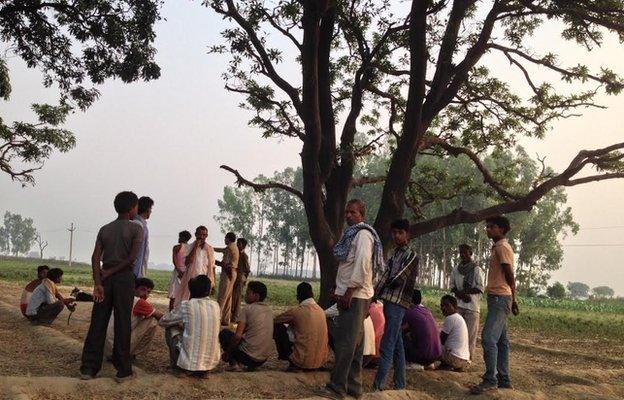
Angry villagers protested at the tree where the girls were found hanged in Badaun district
There was global outrage when two Indian girls were found hanging from a mango tree last May.
Initial reports said the girls had been gang raped by a group of villagers and hanged. But in a shocking about-turn in November, federal investigators said the teenagers took their own lives.
On Thursday, the girls' families challenged the investigators' report in the district court in Badaun in northern India, demanding further investigations in the case.
BBC Hindi's Ankur Jain tries to find answers to the mysterious deaths in the village of Katra Sahadatganj.

The village
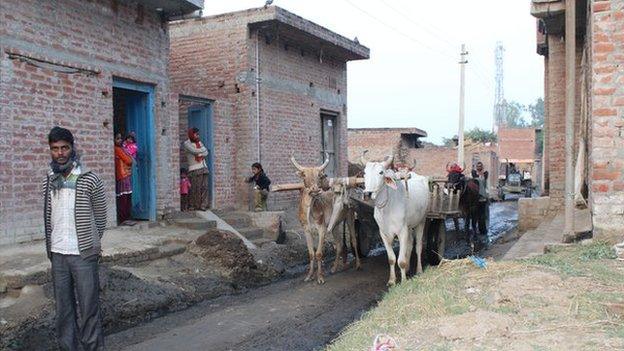
Katra Sahadatganj village is mostly inhabited by small farmers and landless farm workers
Katra Sahadatganj is a nondescript village of 4,000 people in northern Uttar Pradesh state. It is mostly inhabited by small farmers and landless farm labourers.
There are no lavatories at home and women have to go to the open fields before sunrise and after sunset to relieve themselves.
On the night of 27 May, the girls left home at around 8pm, saying they were going to the toilet.
A search party looked for them for several hours but could not find them.
Later that night, the lower-caste cousins, aged about 12 and 14, were found hanging from a tree.
Three brothers, belonging to a somewhat higher caste, were accused of gang rape and murder and arrested, but were freed on bail in September after federal investigators said new forensic tests had concluded the girls were not sexually assaulted.
The Central Bureau of Investigation (CBI) says the elder girl had "an intimate relationship" with the main accused Pappu Yadav and her younger cousin was "facilitating the relationship".
The girls killed themselves because they were afraid of facing their families after they were discovered by Nazru, a neighbour who is also the main witness in the case, the CBI adds.
Few in the village are convinced by the CBI's suicide story - rights groups have called it a partisan investigation and the girls' families have rejected the findings.

The witness
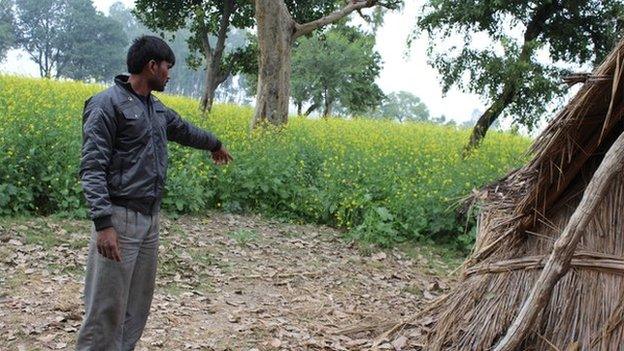
The main witness Nazru shows the spot where he says he found the girls with Pappu Yadav
Curiously, both the CBI and the girls' families are relying on the same witness to prove their accounts, even though he has changed his statement more than once.
Nazru initially said the girls were abducted by five men from the fields, but later changed his statement to say that he stumbled upon the elder sister being intimate with Pappu Yadav while the younger girl kept a watch.
The CBI report quotes Nazru as saying that on being discovered, the girls ran. Afraid that he would tell their families, they killed themselves, it adds.
Nazru now insists he "was lying in my earlier statements. But when I was beaten during investigation, I had to reveal the truth to the CBI".
In his statement to the CBI, the main accused Pappu Yadav said it was the younger sister who had arranged the meeting and that he paid them money for sex with the elder sister.
Investigators say the cousins and the accused had made 400 phone calls to each other.
Asks Jeevanlal, father of one of the girls: "How come no one heard the girls talking to Pappu Yadav in our one-room house? Why did the younger girl commit suicide? The CBI tortured Nazru and forced him to lie."

The mango tree
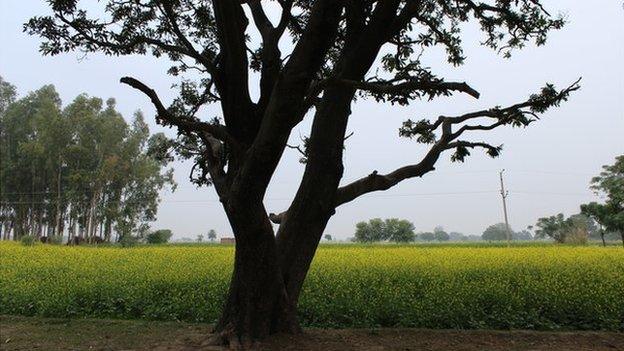
The girls were found hanging from this mango tree
The girls were found hanged from a mango tree that stands behind the brick house of the three accused brothers.
The barely five-feet-tall cousins were found hanging with their scarves from branches that were eight to 10ft (3m) high.
The forensic experts in their report say "the girls picked this tree as it was the easiest to climb".
But Virendra, brother of one of the girls, rejects the claim: "Policewomen tried and could not climb the tree without a stand during the day. It is impossible that my sisters could do so at 2am."
Deviram, another villager, says if indeed the girls were "afraid of facing the hundred villagers who were searching for them", they would pick an "easier" mode of suicide like taking poison.
The CBI report says if the girls were forcibly hanged, someone would have heard their cries.
On one side of the tree are open fields but on the other side, a little distance away, there is a small settlement of 15 houses.
Shyamal, who stays in one of these houses, says: "It was harvest time. After working the whole day, I sleep really soundly and no cries would reach my ears."
Argues Sohanlal, father of one of the girls: "If they were hanged after killing, then who could hear their cries?"

The doctors
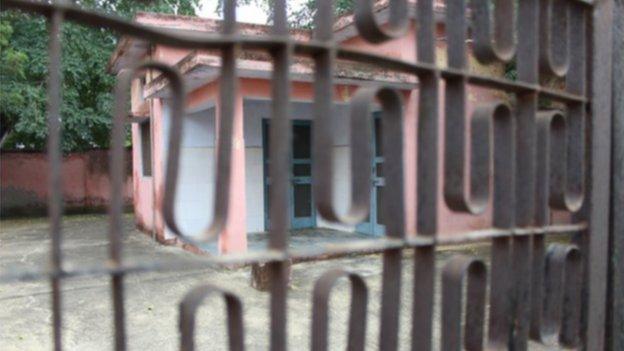
The place where the initial post-mortem was conducted
Doctors, however, insist that the girls were alive when they were hanged.
"The girls died after being hanged," says Dr Rajiv Gupta who carried out the post-mortem along with Dr Avdhesh Kumar and Dr Pusha Pant.
The initial post-mortem report said the girls were sexually assaulted and there were injury marks near their vagina.
But tests conducted since then on vaginal swabs and the girls' clothing have concluded the girls were not sexually assaulted, the CBI said.
It is not just the CBI which has questioned the post-mortem findings - Dr Gupta and Dr Kumar also admit that it was shoddy.
"We generally carry out an autopsy during the day, but these autopsies were performed at night. The lady doctor who examined the sisters was doing a post-mortem for the first time," says Dr Gupta.
"Bad light and a large mob outside the post-mortem facility were just a few reasons for the careless post-mortem. But the lady doctor was [also] an experienced hand and would not go wrong in determining sexual assault," says a local police officer who was part of the investigations before the CBI took over the case.
"The biggest mistake was that the doctors didn't collect pubic hair and nail, crucial evidence to confirm or rule out sexual assault," he adds.

The investigators
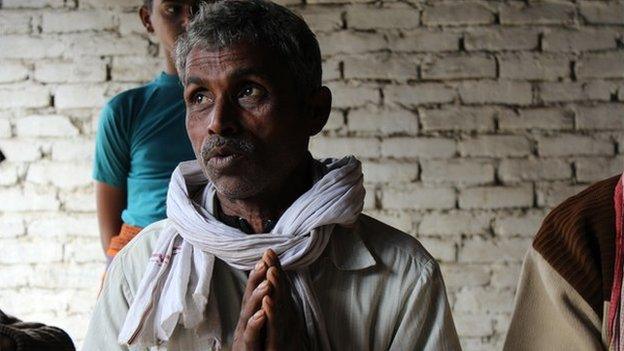
The father of one victim said he was ridiculed by police when he sought help in finding his missing daughter
After the girls were found hanged, the father of one victim said he was ridiculed by police when he sought help in finding his missing daughter.
He said when policemen found out that he was from a lower caste, they abused him and refused to look for his daughter.
Two policemen from the local police station were suspended for "dereliction of duty" and taken into custody. They were later bailed.
This is not the only case in Badaun where police have been accused of shoddy investigations.
Local television journalist Ankur Chaturvedi, who reports on crime stories in the state, says: "It's common here for the police to change a homicide case to suicide."
"Last year, in a suicide case when I saw the crime scene photographs, the girl's body was hanging holding on to a sari with knees touching the ground. How can anyone die like that? That case is still under investigation."
A few miles from Katra Sahadatganj, in Badaun district jail, four months ago a five-foot-tall inmate's body was found hanging from a wall hook, which was placed less than four feet from the ground.
Post-mortem reports called it a homicide as he had bruises on his body but police have registered it as a suicide.
